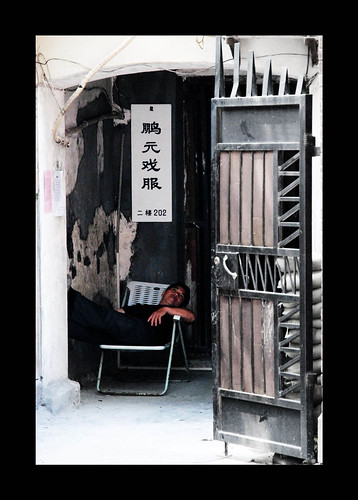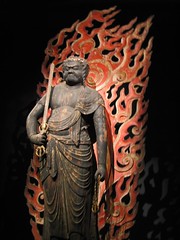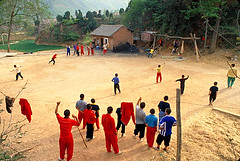This created its own problems. As more sohei became invisible, the maids of Gwinch’s household began having problems with “spirits.” While Gwinch answered the maids cries for help, the invisible sohei became increasingly ruthless—threatening to kill women who didn’t remain quiet in the face of their advances. Gwinch was more than ready when the time to visit Jourdain’s house arrived.
The Hop Sing (a.k.a. Dirty Rain) gang, had made a claim to the House, with about two dozen of their members camped throughout the ground floor. They were in the process of converting it into a tavern and brothel, and offered Gwinch and associates a promotional discount. But they were also willing to accommodate a desire to kill monsters. The party was admitted in to the dining room, barricaded inside, and told to remove the pile of rocks blocking a hole in the fireplace. Gwinch devised a nice trap to control the outflow of ghouls to about one or two at a time, to be easily dispatched by superior numbers. But the trap malfunctioned a couple times and when this happened, Gwinch lost two sohei . Gwinch decided to take their bodies to the Temple of the Two-Fold Path.

Sheeva was caustic at first, asking the monks around her whether any of them wanted to join Gwinch and get killed. But Gwinch was supplicant, and an agreement was made that Sheeva would accompany Gwinch to his house while the monks prepared their brothers’ bodies for a funeral, and that this would occur the next day.
Back at Gwinch’s house, Sheeva explained that the temple was in such bad place because of the extortionary activities of the various gangs who ruled the ruins of the city. She wanted to go back to the Kobar valley. Gwinch was willing to accompany her, but he was duty-bound to assist in preparing a banquet. So they advised a better plan—Gwinch would insinuate that Sheeva had fled the city, so that her enemies would seek her outside while she was in fact laying low at Gwinch’s house. So Gwinch returned to the temple with Saisho and a group of sohei, to start the rumor and to perform the funeral.
The monks heard the news with anger, certain that Sheeva had stolen from them. Ali, a secular man who resided at the temple, heard Gwinch’s story and responded with shock and outrage, but did not resolve to do anything, suggesting blithely that Gwinch should “just do the funeral himself.” In the course of his short visit, he saw other signs of the temples weirdness. There were twin monks who accussed and attacked each other. And there was talk about the flying creatures in the garden whom some wanted killed and others thought should be protected. At last the funeral was conducted outside the temple, in a clear spot among the ruins.
Gwinch agreed with Sheeva that she should be his teacher and this involved allowing her to stay in his room, while he went to stay with the maids. (They were honors to have the master protecting them from the spirits.) And then he decided to make another foray to the House of Jourdain.

Won Lee, of the Sing Hop gang explained that he and his men had dealt with the rest of the ghouls themselves. If they were interested in exploring the basement, they would need to accompanied by some of his men who would expect a share of the treasure. Also, he was required to secure their safe return by leaving a sum of insurance money. Gwinch had no money and so hostages were accepted as a substitute.
In the cellars, they came upon a group of humans adventurers who seemed more or less normal except that they were fast asleep in a dank musty cellar room and that the women in their group was wrestling in her sleep with a fox. When the party entered the room, the fox fled, and the sleepers awakened. The woman was distressed that “Omesa” was gone, while others were distressed that the sumptuous banquet they had just enjoyed was in fact nothing more than cobwebs and dust. The leader of the group was a member of the diplomatic mission from Zipang—he and Gwinch made a mutual agreement to keep each other’s presence in the house of Jourdain a secret and to meet in the future to discuss the mysterious fox.


